Public Health Communications

Social Change Marketing
What motivates people to change their behavior for the better? Good question! It’s one we contemplate daily as we face the health, safety, environmental and equity issues that drain the vibrancy out of our community.
Create Change Lab brings together talented communication professionals to create multi-platform campaigns aimed at informing and influencing the behaviors of targeted populations. Our most recent work is in the areas of health promotion, substance abuse prevention, sexual assault prevention and alternative transportation.
Social Marketing is the methodology of Public Health Communications.
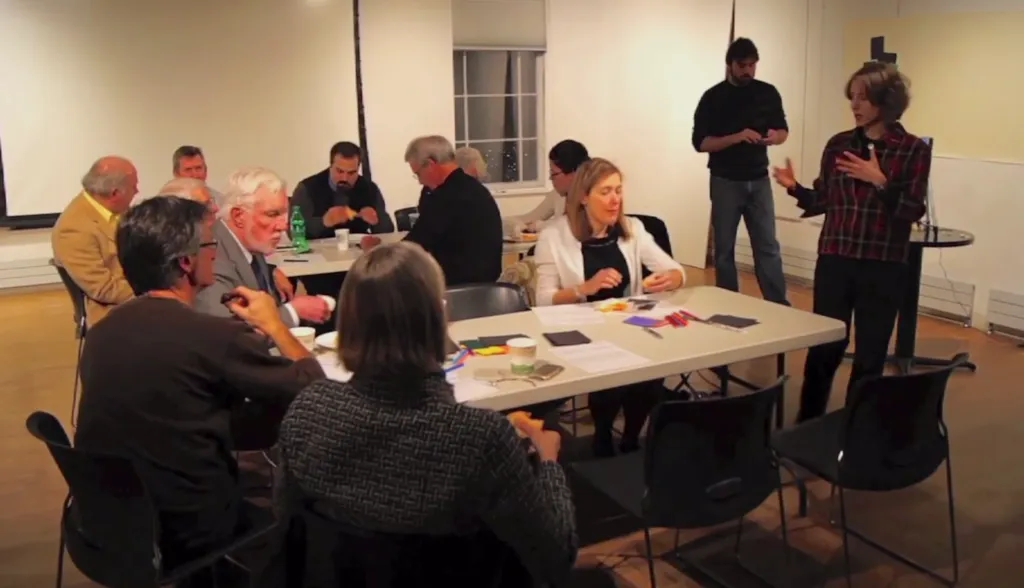
What We Do
Qualitative research to better understand the target population
Campaign strategy, tactics and implementation
Copywriting
Evaluation design
Strategic partnerships
Clients Include
The Vermont Department of Health
Women Infants and Children program (WIC), with the goal of increasing the duration of breastfeeding in this population.
UP for Learning (on behalf of the Vermont Agency of Education and Vermont School Boards Association), creating campaigns and engagement interventions to support school change efforts, including Act 77 and Proficiency-Based Learning. Also working on Mindset, Motivation, and Metacognition campaigns to reinforce positive attitudes about learning.
VT FEED (Food Education Every Day)
A collaboration of Shelburne Farms, NOFA-VT, and FoodWorks, producing a video documentary on the Farm to School movement in Vermont. This project encourages the consumption of fresh fruits and vegetables among students through hands-on farm, cooking, and nutrition education activities.
Town of Hinesburg, Vermont
Campaign to motivate the entire town to carpool more.
Mt. Anthony High School
Underage drinking prevention coupled with high school completion initiatives.
United Counseling Services of Bennington
Increasing parent involvement in their children’s lives as an intervention for underage drinking.
Southern Vermont College
Reduction of underage and binge drinking using a Social Norming approach.
Springfield Middle School
Reduction of underage drinking.
Springfield High School
Reduction of underage drinking.
Springfield Prevention Coalition
Reduction of binge drinking in 21+ young adults.
Champlain College
Reduction of underage drinking using a Social Norming approach.
Sample Campaigns
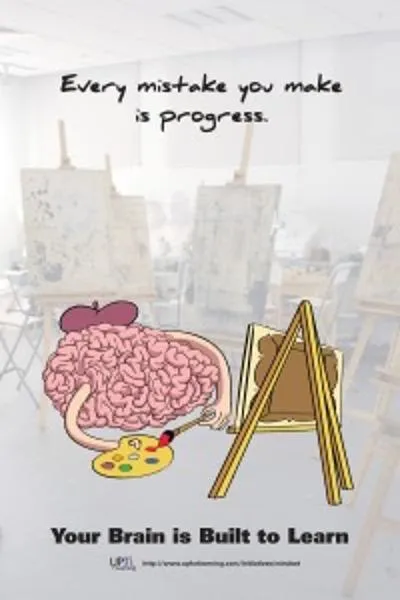
Mindset, Motivation and Metacognition
Many students stop themselves short of reaching their full potential, because of a negative or limited mindset — they just think they can’t do something or aren’t good at it. And that stops them in their tracks. But we know from the field of brain research that intelligence is not fixed, and continues to grow. Just knowing that actually increases one’s ability to learn.
The M3 Campaign materials, co-developed with youth-adult teams from around the State, aim to inspire the adoption of the growth mindset.
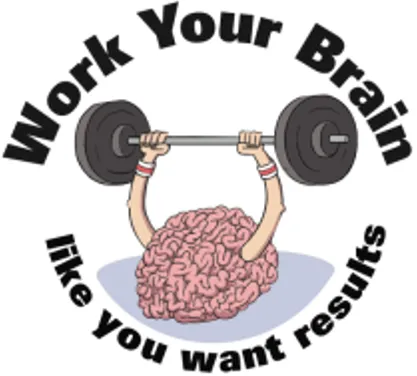
Using Social Norms to Address Underage Drinking
The Challenge
Southern Vermont College is a growing private school with a strong emphasis on career preparation. Because of its competitive tuition and relationships to feeder schools in New York State, the population is exceptionally diverse for Vermont. Excessive alcohol consumption is often seen as a birthright, or at least a required rite of passage, but often leads to several other risk behaviors effecting both individuals and the community as a whole. Of particular concern was the role of alcohol in providing sexual consent.
The Discovery
Mining data from the Core Institute health assessment survey (CORE), there were many promising self-reported behaviors that could be used to “norm” perceptions around alcohol use on campus.
The Actions
Students, the target audience for the campaign, were engaged at every step of the development process, with design, messaging, placement and selection of personal items (swag) that they would proudly wear, spreading the message. Materials featured images of hardworking SVC students, and final forms included decals, posters, table tents, lanyards, sunglasses, water bottles, buttons and T-shirts — many of which featured the popular campaign slogan Sober is Sexy.
The Results
Positive results were seen in several places in a follow-up implementation of the CORE survey. Highlights include:
– Students think the average student drinks alcohol at least once per week or more goes down by 5.9%
– Students self-report that their personal behavior of drinking once or more per week goes down by 10.5%
– Students didn’t drink the last time they had intercourse increases to 84.7%
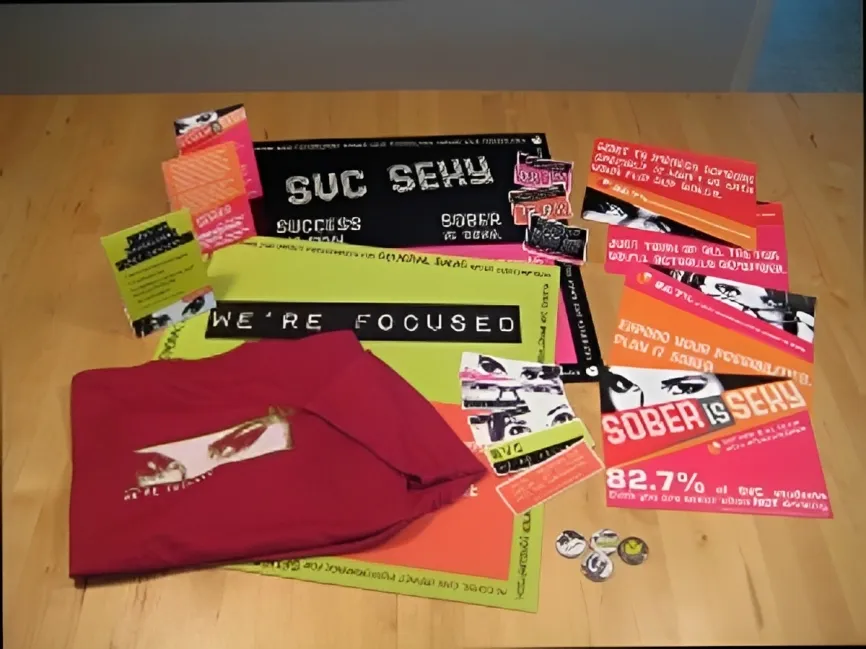

Using Social Norms to Address Underage Drinking


Bumper stickers were a hot item.
The Challenge
During the last century, the town of Springfield, Vermont [pop. 9,373] was a hub for tool and machinery manufacturing. Large red brick buildings line the river flowing through town, and one can imagine a thriving heyday. Then, manufacturing of this sort went overseas, and those stately buildings are now almost all abandoned and condemned, along with many empty storefronts on Main Street. Growing up and living in Springfield, people drive by the sight of failure multiple times per day. Alcohol abuse among teens is among the highest in the state.
The Discovery
In-depth interviews and focus groups with the target audiences led to great insights. [We worked on campaigns for the middle school, high school and 21-25 year olds, and conducted primary research with each group.] Among the 21-25 year olds, we discovered that the people who drank moderately had goals and dreams that they were working on (finishing school, getting a better job), and the people drank heavily did so because there was little that they were looking forward to. So we set about to ignite aspirations.
The Action
A multi-platform campaign centered around the theme of “Springfield Dreams,” and included bumper stickers, t-shirts, and an online video contest. Our aim, with very limited budget, was to engage the entire town in a three-month imagination exercise, to envision and dream of their future — individually and collectively. A re-branding campaign sponsored by the Chamber of Commerce was also underway.
The Results
Positive responses about the campaign and materials came from many stakeholders as well as the target population. There was a high level of awareness about the campaign, and there are plans to continue it annually. Participation in the online video contest would have benefited by having additional resources to do more on-site interviews.
Increasing Breastfeeding
The Vermont Department of Health’s Women Infants and Children (WIC) Program, was interested in a social marketing campaign that would lead to increasing the duration of breastfeeding in their population, which is generally a lower socio-economic and multi-cultural demographic.
We developed a highly visual campaign that focused on the benefits of breastfeeding, and the peer support available for overcoming obstacles.
Elements of the campaign included:
– Breastfeeding Checklist;
– Short-form comic book Main Street Moms “I Got Milk!”;
– Lifestyle magazine, “Born and Raised the Vermont Way”;
– DVD and web video of national expert Amy Spangler describing what to expect in the early days of breastfeeding;
– Cause bracelet for both the mom and support team to wear to the hospital, that say “I’ve Got Milk,” and “We’re Breastfeeding”;
– A tag to attach to the baby’s first carrier;
– And additional materials targeted towards health care providers.
The campaign was part of a research study, that had positive outcomes. The campaign plus a programmatic intervention of a 1:1 consult resulted in a significant increase in both the initiation and duration of breastfeeding.
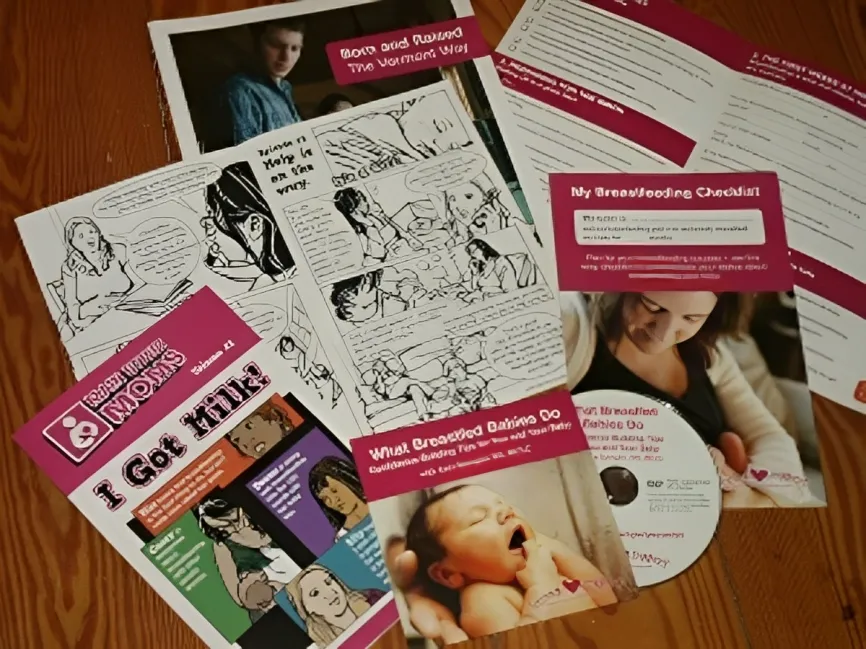
Campaign media included instructional video series, web site, personal products, and multiple print pieces, including a comic.
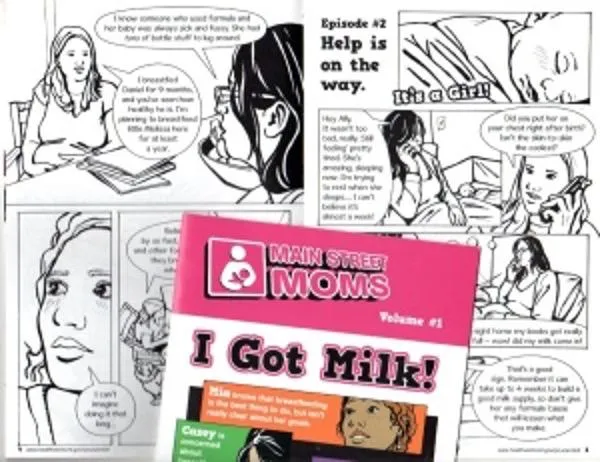
Comic used to model women overcoming obstacles to long-term breastfeeding.
© 2026 Create Change Lab, LLC - All Rights Reserved - Privacy Policy
